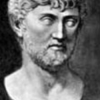Lucretius

Lucretius
Titus Lucretius Caruswas a Roman poet and philosopher. His only known work is the epic philosophical poem De rerum natura about the tenets and philosophy of Epicureanism, and which is usually translated into English as On the Nature of Things...
NationalityRoman
ProfessionPoet
fall atheism atoms
Globed from the atoms falling slow or swift I see the suns, I see the systems lift Their forms; and even the systems and the suns Shall go back slowly to the eternal drift.
believe hands atoms
At this stage you must admit that whatever is seen to be sentient is nevertheless composed of atoms that are insentient. The phenomena open to our observation so not contradict this conclusion or conflict with it. Rather they lead us by the hand and compel us to believe that the animate is born, as I maintain, of the insentient.
imperfection atoms venture
Even if I knew nothing of the atoms, I would venture to assert on the evidence of the celestial phenomena themselves, supported by many other arguments, that the universe was certainly not created for us by divine power: it is so full of imperfections.
bitter food
What is food to one is to another bitter poison.
stones doe heavy
If God can do anything he can make a stone so heavy that even he can't lift it. Then there is something God cannot do, he cannot lift the stone. Therefore God does not exist.
food man
What is food to one man is bitter poison to others.
lying mind atheism
True piety lies rather in the power to contemplate the universe with a quiet mind.
fortune morrow doubtful
It is doubtful what fortune to-morrow will bring. [Lat., Posteraque in dubio est fortunam quam vehat aetas.]
light wind white
The gods and their tranquil abodes appear, which no winds disturb, nor clouds bedew with showers, nor does the white snow, hardened by frost, annoy them; the heaven, always pure, is without clouds, and smiles with pleasant light diffused. [Lat., Apparet divom numen, sedesque quietae; Quas neque concutiunt ventei, nec nubila nimbeis. Aspergunt, neque nex acri concreta pruina Cana cadens violat; semper sine nubibus aether Integer, et large diffuso lumine ridet.]
law fixed all-things
All things obey fixed laws.
men understanding mind
How wretched are the minds of men, and how blind their understandings. [Lat., O miseras hominum menteis! oh, pectora caeca!]
infinite endless everlasting
All things keep on in everlasting motion, Out of the infinite come the particles, Speeding above, below, in endless dance.
sea watches shore
Tis pleasant to stand on shore and watch others labouring in a stormy sea.
wind air should
Air, I should explain, becomes wind when it is agitated.